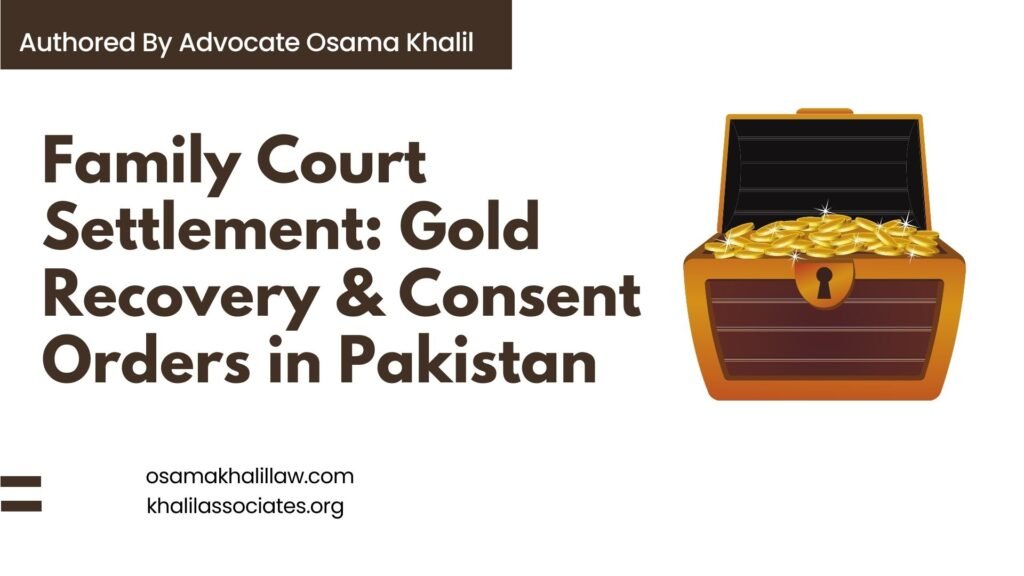
Family disputes can often lead to complicated legal battles. However, courts use clear legal principles to ensure fairness. In this case, the Sindh High Court resolved a dispute between Syed Muhammad Qasim and Mst. Hafsa Qasim regarding gold jewelry, dowry items, and personal documents. This judgment provides a valuable lesson on legal consent orders and the responsibilities of legal counsel.
Background of the Case
To begin with, Syed Muhammad Qasim and Mst. Hafsa Qasim married on October 16, 2015. Unfortunately, their relationship became strained, and they eventually separated. As a result, Mst. Hafsa Qasim filed facing a family dispute a family suit to recover specific items. Specifically, she sought:
- Dower amount: Rs. 25,000
- Personal documents
- Dowry items and gold jewelry: If not returned, she requested compensation of Rs. 400,000.
Initial Court Decision – Family Disputes
The case was heard by the XVIth Civil and Family Judge Karachi (Central). After thoroughly considering the evidence, the court issued a judgment on October 16, 2020. The decision stated:
- Dower Payment: Mst. Hafsa Qasim was entitled to receive Rs. 25,000.
- Dowry Articles: Most dowry items were returned; however, two tolas of gold remained missing. The court ordered the husband to return the gold or pay Rs. 150,000 instead.
Appeal and Settlement
Following the initial judgment, Syed Muhammad Qasim filed an appeal in the VIth Additional District and Sessions Court Karachi (Central). During the appeal hearing, his legal counsel conceded that one gold jewelry set belonged to Mst. Hafsa Qasim. Consequently, the respondent agreed to give him three months to return the jewelry. The court recorded this agreement as a consent order on January 15, 2021.
The Constitutional Petition – Karachi Family Dispute
Despite the settlement of his family disputes, Syed Muhammad Qasim filed a constitutional petition under Article 199 of the Constitution. He argued that:
- His lawyer acted without permission.
- He faced financial difficulties, making it impossible to comply with the order.
The court carefully analyzed the case and referred to a prior Supreme Court ruling (Amanullah Soomro v. P.I.A., 2011 SCMR 1341). The judgment emphasized that clients bear responsibility for their lawyer’s actions in court unless proven otherwise.
Court’s Analysis and Decision
The court explained that the consent order was valid because the counsel’s statement was recorded during formal court proceedings. If the petitioner believed the lawyer acted without authority, he could file a complaint against the lawyer instead of challenging the order. Moreover, the court highlighted that such petitions could not be used to delay justice.
Ultimately, the court dismissed the petition, stating that Mst. Hafsa Qasim had rightfully pursued her case and deserved to receive the jewelry or its monetary equivalent without unnecessary delays.
Key Takeaways – Marital Property Settlement
This case illustrates several important legal principles:
- Significance of Consent Orders: Statements made by legal counsel in court, when recorded as settlements, are binding.
- Client Responsibility: Clients are responsible for their lawyer’s court statements.
- Proper Legal Remedies: If a client disputes their lawyer’s actions, the correct approach involves filing a complaint against the lawyer, not a constitutional petition.
Conclusion
In conclusion, family disputes require clear communication and trust between clients and their legal representatives. In this case, the court upheld a fair settlement, ensuring that Mst. Hafsa Qasim received her rightful belongings. This judgment serves as a reminder that legal obligations must be honored, and courts will not tolerate undue delays in delivering justice.
